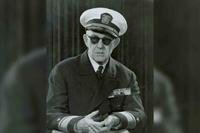On Friday, President Trump issued an executive order that removes Chairman of the Joint Chiefs of Staff Gen. Joseph Dunford and the incoming Director of National Intelligence (almost certain to be nominee and former Indiana Senator Dan Coats) from the National Security Council Principals Committee and replaces them with White House advisor Steve Bannon. The chairman of the Joint Chiefs and the DNI would attend meetings "where issues pertaining to their responsibilities and expertise are to be discussed."
OK, there's a lot going on here. There's the president's right to run the show as he sees fit and there are the statutory laws about how a president is allowed to run the government.
Former Defense Secretary Robert Gates (who served under two presidents: George W. Bush and Barack Obama) sees a problem there. "My biggest concern is there are actually, under the law, only two statutory advisers to the National Security Council and that's the director of Central Intelligence, or the DNI, and the chairman of the Joint Chiefs of Staff. I think pushing them out of the National Security Council meetings, except when their specific issues are at stake, is a big mistake," said Gates.
On Face the Nation this past Sunday, Senator John McCain also voiced concerns: “I am worried about the National Security Council. Who are the members of it and who are the permanent members? The appointment of Mr. Bannon is something which is a radical departure from any National Security Council in history."
Yesterday White House spokesman Sean Spicer said this is all a big deal about nothing. "The principals committee is merely the NSC minus the president," Spicer said. "The idea that the chairman of the Joint Chiefs of Staff and the DNI are being downgraded or removed is utter nonsense."
"They are at every NSC meeting and are welcome to attend the principals meetings as well," he said. "To be clear, the memo lays out that if there's a principals meeting that is outside their scope -- for example, a domestic issue that doesn't pertain to the military -- they're not required but certainly welcome to be in attendance."
Bannon, the former Breitbart editor, has a close relationship with the president and Spicer defends his qualifications. “Steve has an extensive military background, extensive background in geopolitical affairs, and the assumption that he's playing the same role as Karl Rove is just not accurate,” Spicer said in an interview with MSNBC. “And so, he brings to the table a much greater scope of the political landscape, vis-a-vis the world — the geopolitical landscape in national security affairs. And I think codifying it and putting it out there is something we're not trying to hide. In the Obama administration, they had people going in and out of NSC meetings without people knowing unless they got caught wind of.”
So, what's the issue here? For a president who's appointed more military men and women to high-level administration posts than we've seen in generations, an order that specifically relieves Gen. Dunford of some of his statutory duties seems out of character. Should he change a system that's been in place since the creation of the National Security Council in 1947? Or does President Trump have a good reason to make the change? Sound off!




